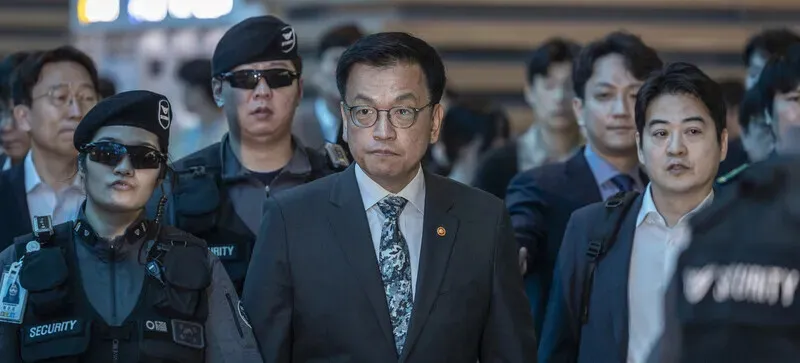hankyoreh
Links to other country sites 다른 나라 사이트 링크
[Editorial] Korea must resist US pressure to reach rushed tariff deal

The finance and trade ministers of South Korea and the US are set to engage in trade talks on Thursday evening in Washington, DC. While the South Korean administration insists that these are “consultations” and not “negotiations,” there is good reason to believe that these talks mark the beginning of tariff negotiations in earnest.
Korea’s negotiators should proceed with caution and determination, lest they get caught up in the US’ attempts to blaze through talks and come out worse for wear.
US President Donald Trump has been facing a myriad of internal and external headwinds, such as China’s aggressive response to his tariff provocations, uncertainty within the stock and bond markets, fears of a recession, declining approval ratings and growing protests of his administration.
Trump desperately needs to eke out a win from negotiations with the allies he has chosen to prioritize talks with, such as South Korea, Japan, Australia and others. We shouldn’t forget that the upcoming talks with the US were, in fact, initiated by the US.
His urgency could also be behind Trump’s surprise appearance at the ministerial-level trade talks between the US and Japan on April 16 to press Japan to increase its burden-sharing obligation for the US Forces Japan. There is no reason to not expect such unexpected behavior from Trump during the upcoming negotiation with South Korea. The South Korean delegation should thoroughly prepare so that it can deftly navigate itself out of any number of scenarios.
Exports to the US from April 1 to April 20 have decreased by a whopping 14.3%, demonstrating how the Trump administration’s threats to implement tariffs have already started to affect trade.
Korean steel and automobiles currently face a tariff of 25% when they enter the US, with other products subject to the baseline 10% tariff. Korea’s objective should be to reduce tariffs on steel and automobiles and 25% reciprocal tariffs, which are currently on pause for 90 days.
No matter the urgency of alleviating these tariffs, Korea should refrain from negotiating a deal that will be detrimental to us in the long run. As Trump’s policies have met severe backlash, we are still in the dark as to where his tariff policy will end. As the US ratchets up the pressure on us for the sake of fielding tangible results, we should not let that influence our decisions or the pace of the negotiations.
Increasing South Korea’s contributions to the US Forces Korea defense costs and participating in the Alaska project are decisions that should be approached with extreme caution.
We can’t let Trump’s intent to treat the talks as “one-stop shopping” rattle us. The upcoming negotiations are not only concerned with lowering tariffs, but also part of the big picture for “cooperation between the Trump administration and South Korea’s new administration in the economy and defense fields for the next four years,” to borrow the words of former Trade Minister Yeo Han-koo. This is not an issue where the acting presidency, which only has around 40 days left in power, should rush to conclusions.
Please direct questions or comments to [english@hani.co.kr]

Editorial・opinion
![[Column] Imperial tyranny, Korean humiliation [Column] Imperial tyranny, Korean humiliation](https://flexible.img.hani.co.kr/flexible/normal/500/300/imgdb/original/2025/0912/7617576652278449.jpg) [Column] Imperial tyranny, Korean humiliation
[Column] Imperial tyranny, Korean humiliation![[Correspondent’s column] Cognitive dissonance in MAGA world [Correspondent’s column] Cognitive dissonance in MAGA world](https://flexible.img.hani.co.kr/flexible/normal/500/300/imgdb/original/2025/0912/3417576648512186.jpg) [Correspondent’s column] Cognitive dissonance in MAGA world
[Correspondent’s column] Cognitive dissonance in MAGA world- [Editorial] Korea, US need a ‘gentlemen’s agreement’ on what job creation entails
- [Column] Why MAGA has its eyes set on Korea
- [Column] Lee still has his work cut out for him after summit with Trump
- [Editorial] Is this any way for the US to treat an ally?
- [Column] Lee’s difficult task of striking a balance on Japan
- [Editorial] Multipolar era means Seoul must broaden its diplomacy
- [Column] North and South Korea are no longer pawns in US-China-Russia relations
- [Column] Who we fail when we oversimplify the ‘comfort women’ issue
Most viewed articles
- 1[Column] Imperial tyranny, Korean humiliation
- 2‘What have we done to deserve this?’ Korean workers decry ‘degrading’ treatment in ICE detention
- 3The woman profiting from spreading anti-China, election fraud conspiracy theories
- 4[Interview] Can democracy survive without America?
- 5Seoul says US must fix its visa system if it wants Korea’s investments
- 6[Exclusive] US has no plan to reduce USFK troop numbers, Indo-Pacific commander tells Korea
- 7[Column] Georgia ICE raid is a test for Korea-US relations
- 8Korea to raise issue with US over rights abuses faced by detained workers
- 9Eldest son of Samsung’s Lee enlists as officer candidate in South Korea’s Navy
- 10[Correspondent’s column] Cognitive dissonance in MAGA world